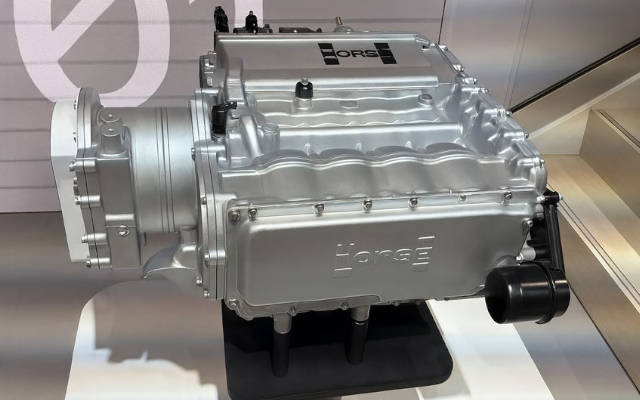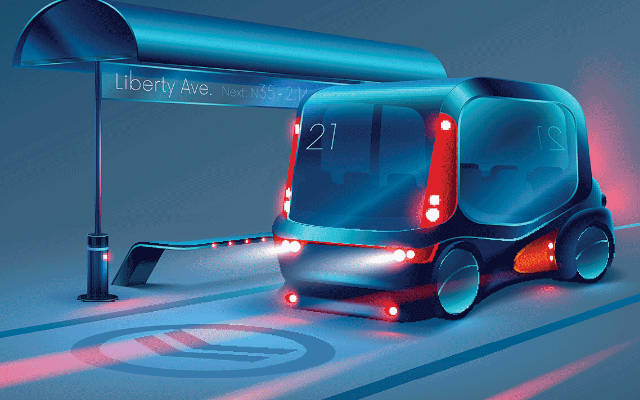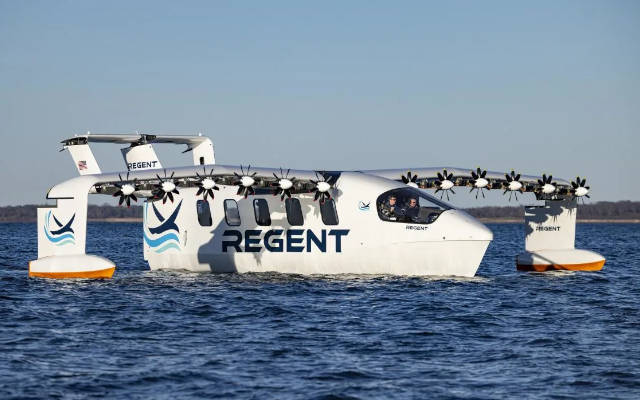 EDITOR'S PICK
EDITOR'S PICK
The West is Driving in the Rearview Mirror: A Wake-Up Call from the Electrotech Revolution
24 Sep 2025 | Synopsis
 Kingsmill Bond argues the West is deluding itself about the energy transition. The "electrotech revolution" led by solar, batteries, and EVs is already here, advancing exponentially, and is cheaper than fossil fuels. While emerging markets are embracing this, the West risks being left behind by its outdated assumptions and a linear mindset toward change.
Kingsmill Bond argues the West is deluding itself about the energy transition. The "electrotech revolution" led by solar, batteries, and EVs is already here, advancing exponentially, and is cheaper than fossil fuels. While emerging markets are embracing this, the West risks being left behind by its outdated assumptions and a linear mindset toward change.XCharge NA Is Now Leasing DC Fast Chargers To Small Businesses
24 Sep 2025 | Synopsis
 XCharge North America has partnered with Ascentium Capital to offer a leasing program for DC fast chargers, aimed at small businesses. This program allows businesses to install chargers, like the GridLink and C6 models, for an affordable monthly rate starting at $800, removing the need for a large upfront investment. The leasing package includes installation, equipment, warranties, and maintenance, and lets the business keep all the charging revenue.
XCharge North America has partnered with Ascentium Capital to offer a leasing program for DC fast chargers, aimed at small businesses. This program allows businesses to install chargers, like the GridLink and C6 models, for an affordable monthly rate starting at $800, removing the need for a large upfront investment. The leasing package includes installation, equipment, warranties, and maintenance, and lets the business keep all the charging revenue.Realistic Assessment: Horse Powertrain's C15 Engine and the Future of EV
22 Sep 2025 | Synopsis
 Horse Powertrain's C15 is a compact, Euro 7-compliant gasoline generator designed for extended-range EVs. It activates only when battery charge drops, offering 70 kW for sedans and 120 kW for larger vehicles. While efficient, it still emits 120–140 g CO₂/km when active. Backed by Renault, Geely, and Aramco, Horse can mass-produce it—but OEM adoption is key. EREVs face pressure from falling battery costs and rising BEV capabilities.
Horse Powertrain's C15 is a compact, Euro 7-compliant gasoline generator designed for extended-range EVs. It activates only when battery charge drops, offering 70 kW for sedans and 120 kW for larger vehicles. While efficient, it still emits 120–140 g CO₂/km when active. Backed by Renault, Geely, and Aramco, Horse can mass-produce it—but OEM adoption is key. EREVs face pressure from falling battery costs and rising BEV capabilities.In Just 15 Years, No One Will Own an Electric Car - Here's What Will Replace Them Instead
21 Sep 2025 | Synopsis
 EVs are central to a coming shift in mobility: by 2040, personal electric car ownership may disappear as automakers pivot to subscription-based, software-driven models. EVs will serve as platforms for autonomous fleets, shared transport, and tiered digital services. Younger users prefer access over ownership, and manufacturers are redesigning vehicles as connected devices - raising concerns over repair rights, data control, and user autonomy.
EVs are central to a coming shift in mobility: by 2040, personal electric car ownership may disappear as automakers pivot to subscription-based, software-driven models. EVs will serve as platforms for autonomous fleets, shared transport, and tiered digital services. Younger users prefer access over ownership, and manufacturers are redesigning vehicles as connected devices - raising concerns over repair rights, data control, and user autonomy.US Firm Bids To Bring 'Flying Boats' to Scottish Islands Transport Network
21 Sep 2025 | Synopsis
 US firm Regent is partnering with Scotland’s Hitrans to explore using electric "flying boats" called Seagliders for island transport. These vessels combine boat, hydrofoil, and low-altitude flight technologies, reaching speeds up to 180 mph. A 12-passenger model may launch in Orkney by 2026–2027, with a larger version planned for 2030. The project aims to improve connectivity and reduce emissions across the Highlands and Islands.
US firm Regent is partnering with Scotland’s Hitrans to explore using electric "flying boats" called Seagliders for island transport. These vessels combine boat, hydrofoil, and low-altitude flight technologies, reaching speeds up to 180 mph. A 12-passenger model may launch in Orkney by 2026–2027, with a larger version planned for 2030. The project aims to improve connectivity and reduce emissions across the Highlands and Islands.
 EVWorld Exclusive
EVWorld Exclusive
Unlocking Heat's Hidden Potential: How a Nanoscale Discovery Could Transform Everyday Tech
24 Oct 2025 |  A recent nanoscale physics breakthrough reveals heat can transfer across tiny gaps far more efficiently than expected - up to 100 times greater than classical predictions. This could revolutionize cooling and energy systems in electronics, EVs, and smart appliances. While engineering challenges remain, early applications may emerge within 3-5 years, with broader consumer adoption possible in the next decade. The future of heat management may be silent, solid-state, and radically efficient.
A recent nanoscale physics breakthrough reveals heat can transfer across tiny gaps far more efficiently than expected - up to 100 times greater than classical predictions. This could revolutionize cooling and energy systems in electronics, EVs, and smart appliances. While engineering challenges remain, early applications may emerge within 3-5 years, with broader consumer adoption possible in the next decade. The future of heat management may be silent, solid-state, and radically efficient.
Turning the Energy Crunch into a Smart Grid Revolution
24 Oct 2025 |  America's energy crunch is not about supply - it's about coordination. Virtual power plants and vehicle-to-grid systems offer a scalable, software-driven solution to rising demand from AI, EVs, and climate volatility. By turning homes, vehicles, and businesses into active grid assets, and aligning policy with technology, the U.S. can build a smarter, more resilient energy future without building more power plants. The tools exist - now it's time to connect them.
America's energy crunch is not about supply - it's about coordination. Virtual power plants and vehicle-to-grid systems offer a scalable, software-driven solution to rising demand from AI, EVs, and climate volatility. By turning homes, vehicles, and businesses into active grid assets, and aligning policy with technology, the U.S. can build a smarter, more resilient energy future without building more power plants. The tools exist - now it's time to connect them.
Auto Retail in 2025: Bridging the Trust Gap Between Dealers and Buyers
24 Oct 2025 |  The 2025 Urban Science and Harris Poll report reveals a growing disconnect between dealers and buyers. While dealers embrace EVs, AI, and digital tools, many buyers remain cautious - especially about full electrification and online-only retail. Brand loyalty is weakening, and policy clarity is key to adoption. The future of auto retail depends on bridging trust, flexibility, and infrastructure gaps.
The 2025 Urban Science and Harris Poll report reveals a growing disconnect between dealers and buyers. While dealers embrace EVs, AI, and digital tools, many buyers remain cautious - especially about full electrification and online-only retail. Brand loyalty is weakening, and policy clarity is key to adoption. The future of auto retail depends on bridging trust, flexibility, and infrastructure gaps.
Electric Icons in the Making: Audi Concept C vs. Chevrolet Corvette EV
23 Oct 2025 |  Audi's Concept C previews a refined electric GT built on the mature PPE platform, likely arriving by 2026. Chevrolet's Corvette EV promises supercar performance but faces packaging and thermal challenges. Audi is closer to production; Corvette remains in early development. Both reflect divergent strategies in electrifying legacy sports cars, with Audi emphasizing platform maturity and Chevrolet pursuing brand continuity through engineering innovation.
Audi's Concept C previews a refined electric GT built on the mature PPE platform, likely arriving by 2026. Chevrolet's Corvette EV promises supercar performance but faces packaging and thermal challenges. Audi is closer to production; Corvette remains in early development. Both reflect divergent strategies in electrifying legacy sports cars, with Audi emphasizing platform maturity and Chevrolet pursuing brand continuity through engineering innovation.
Electrification Is Not an Oversimplification
23 Oct 2025 |  Despite critiques that the quest for global electrification is "simplistic", the transition is strategic and necessary. Grid upgrades, battery innovation, and tailored policies make electrification viable. Sodium-ion batteries and recycling reduce material risk. Compared to fossil fuels, electrification offers cleaner, safer, and more resilient systems. Complexity demands better design - not delay.
Despite critiques that the quest for global electrification is "simplistic", the transition is strategic and necessary. Grid upgrades, battery innovation, and tailored policies make electrification viable. Sodium-ion batteries and recycling reduce material risk. Compared to fossil fuels, electrification offers cleaner, safer, and more resilient systems. Complexity demands better design - not delay.
SEARCH RSSTREAM
 80 New Postings In Past 24 Hours
80 New Postings In Past 24 Hours
Category:mobility
Region:AsiaPacific
Date:24 Oct 2025
Category:mobility
Region:AsiaPacific
Date:24 Oct 2025
Category:finance
Region:NoAmerica
Date:24 Oct 2025
Category:finance
Region:AsiaPacific
Date:24 Oct 2025
Category:mobility
Region:AsiaPacific
Date:24 Oct 2025
Category:energy
Region:IndoAsia
Date:24 Oct 2025
Category:mobility
Region:IndoAsia
Date:24 Oct 2025
Category:review
Region:AustralPacific
Date:24 Oct 2025
Category:mobility
Region:Europe
Date:24 Oct 2025
Category:mobility
Region:NoAmerica
Date:24 Oct 2025
Category:energy
Region:AsiaPacific
Date:24 Oct 2025
Category:energy
Region:AsiaPacific
Date:24 Oct 2025
Category:policy
Region:Europe
Date:24 Oct 2025
Category:mobility
Region:AsiaPacific
Date:24 Oct 2025
Category:mobility
Region:NoAmerica
Date:24 Oct 2025
Category:environment
Region:Global
Date:24 Oct 2025
Category:policy
Region:Europe
Date:24 Oct 2025
Category:mobility
Region:NoAmerica
Date:24 Oct 2025
Category:environment
Region:Global
Date:24 Oct 2025
Category:mobility
Region:Global
Date:23 Oct 2025
